The local theater scene is BOOMING! But have you ever thought about who is behind the creative magic? Well, we’re pulling back the curtain to pay tribute to some of the local folks who create stories for the stage. I threw several questions at some local playwrights to learn a little about them and their creative process.
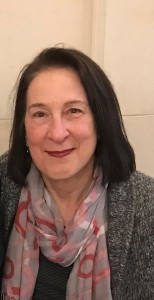 Barbara Schweitzer writes plays, poems and mini-mysteries. Her first collection of poetry, 33 1/3: Soap Opera Sonnets (Little Pear Press, 2008) was named a Best Book by the Providence Journal the year of its publication. Her short plays have been produced regionally in RI, Massachusetts and Maine. Leavetaking and Sub-Zero are published in play and literary anthologies. Her radio essays have been featured on RI’s NPR station in the weekly This I Believe program. M.M., her first full-length play, won a 2017 Rhode Island State Council on the Arts (RISCA) Playwriting Merit Fellowship award, making her a three-time winner.
Barbara Schweitzer writes plays, poems and mini-mysteries. Her first collection of poetry, 33 1/3: Soap Opera Sonnets (Little Pear Press, 2008) was named a Best Book by the Providence Journal the year of its publication. Her short plays have been produced regionally in RI, Massachusetts and Maine. Leavetaking and Sub-Zero are published in play and literary anthologies. Her radio essays have been featured on RI’s NPR station in the weekly This I Believe program. M.M., her first full-length play, won a 2017 Rhode Island State Council on the Arts (RISCA) Playwriting Merit Fellowship award, making her a three-time winner.
“Writing plays is what I like,” says Barbara. “Not only do I love the wide-open page and the myriad relationship possibilities of the genre, but it is such a rich experience to work in collaboration with other theater artists. Theater is the most magical of art forms.” She lives in North Smithfield with her husband and cat.
Alison O’Donnell: What and/or who is your inspiration? Where do you draw your ideas?
Barbara Schweitzer: Most of my ideas bump into me (usually when I am in solitary motion: running, driving, showering). When I “invent” an idea (one that didn’t jump into my mind), it usually gets so heavy I can’t carry it along far enough to make a story. Where ideas come from? Life (as in current events), science (especially medical), but mostly people — those living and not. We people are such elegant messes, and there is nothing better for writing than a mess. Who is an inspiration? All women playwrights and storytellers.
AO: Favorite play ever? Why?
BS: I am sorry I can’t narrow it down except by stopping these thoughts… I love Paula Vogel’s The Baltimore Waltz for its beautifully rendered pain. I love Sarah Ruhl’s Eurydice for its poetic beauty. I love Suzan-Lori Parks’ Father Comes Home from the Wars for its incredible range and agility. Annie Baker’s The Aliens for its powerful softness. I love The Crucible for its transcendent brilliance, Our Town for its depth and simplicity. I love Midsummer Night’s Dream for its magical realism from the 16th century.
AO: How do you handle writer’s block? What hooks get you started?
BS: Oh, the scourge of writer’s block. Life is my writer’s block. It is so seductive and time-consuming to live and work in this beautiful world. The only way I overcome it is to wrestle a chair out of the force of time and sit down with my keypad in front of me. There I start writing a lot of garbage that I then selectively (metaphorically) take out to the curb for trash pickup. It is always painful to watch the accumulation of such stinky stuff, but really there is nothing to do but do it if I want to get to real writing. What brings me over the writer’s block is remembering the process and stepping into it. Sometimes the heaps are not so high (I tell myself before I sit down).
Hooks? Morning. Coffee. Cognition. I keep ideas, notes, scraps of paper everywhere that I thumb through to begin my writing day. Remembering that I am the only person who can tell the story spurs me on. (Anybody else will write it differently.) Also, I remind myself that I don’t have to do it – I don’t have a boss – so I do not have to write if I don’t want to. That always reminds me that I do want to.
AO: What’s next on your slate?
BS: I am just coming off the high of a completed first draft, so I am not thinking of the future. I’m looking forward to the rewrite and discovery of what I meant to say in this play.
AO: Sky’s the limit– what is your ultimate dream project?
BS: To write a play that is so true it rocks both me and the world. And having it read and produced, of course.
AO: What advice would you give to aspiring playwrights?
BS: What I’ve learned is that if I want to make stories 3D (which is what theater uniquely accomplishes), I have to write them first. Then I have to join with other people to make them come alive. Going to theater, joining in, talking to, making friends, engaging in the world is required. Writing requires solitude, but writing for theater requires connections. So the writer’s life is both entirely solitary and entirely engaged with other people. That’s the difference between being a playwright and a poet. A poet can be far more solitary, sending work out, getting acceptances in, doing occasional readings, then coming home. A playwright must walk through the door after their solitary confinement and relate. The actors, directors, theater people and audiences are all part of the play. They infuse the playwright’s words with their unique lives and amazing insights, and this is what makes a play the living art it is.
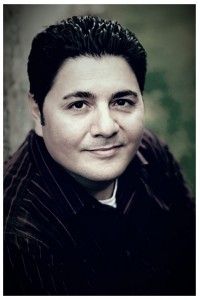 Nick Albanese was a theater major at CCRI, later branching out into local community theater, including the New Playwrights Festival at Brown University. He then began acting in student films at RISD and worked on Hollywood film sets as they came into RI. He even did stand-up comedy for 10 years all over New England and other parts of the country. Always writing ideas down in notebooks, he would come up with one-act plays. Finally, in summer 2007, he wrote, directed and starred in an Internet series called Bread Butter and Bullets. That same summer, he landed a role in the Showtime series Brotherhood. In 2015, Nick wanted to return to his theater roots, so he began writing more one-act plays and did an evening of one-acts with a group of performer friends at Theatre 82 in Cranston. The son of Sicilian immigrants, he produced his one-man play, The Last Sicilian, which had a successful run for two and a half years. In January 2018, Nick brought The Last Sicilian to New York City, inspiring him to start his own theater group when he returned home to Providence, where he lives with his wife and three kids.
Nick Albanese was a theater major at CCRI, later branching out into local community theater, including the New Playwrights Festival at Brown University. He then began acting in student films at RISD and worked on Hollywood film sets as they came into RI. He even did stand-up comedy for 10 years all over New England and other parts of the country. Always writing ideas down in notebooks, he would come up with one-act plays. Finally, in summer 2007, he wrote, directed and starred in an Internet series called Bread Butter and Bullets. That same summer, he landed a role in the Showtime series Brotherhood. In 2015, Nick wanted to return to his theater roots, so he began writing more one-act plays and did an evening of one-acts with a group of performer friends at Theatre 82 in Cranston. The son of Sicilian immigrants, he produced his one-man play, The Last Sicilian, which had a successful run for two and a half years. In January 2018, Nick brought The Last Sicilian to New York City, inspiring him to start his own theater group when he returned home to Providence, where he lives with his wife and three kids.
Alison O’Donnell: What and/or who is your inspiration? Where do you draw your ideas?
Nick Albanese: Well, I’m inspired by people like Billy Crystal, Steve Martin and John Leguizamo, to name a few, because they’re actors as well as writers, just like me, and they inspired me (especially Billy Crystal) to write my own One-Man Play and The Last Sicilian. I get my inspiration from my life, the life around me and the people with their stories or situations.
AO: Favorite play ever? Why?
NA: So many to choose from, but I guess it would have to be A Streetcar Named Desire by Tennessee Williams because I remember reading it in high school and then seeing a couple of local productions. It was my first glance at real theater besides the high school versions of The Wizard of Oz when I was a kid. And then seeing the film with Marlon Brando, knowing him from The Godfather, and him playing such a great character, Stanley Kowalski. Like many actors, for a time I was always watching Brando’s work.
AO: How do you handle writer’s block? What hooks get you started?
NA: By not writing for days, weeks or months! Ha! Yeah, writer’s block is not fun but usually when something comes to me, it’s all at once and sometimes it’s more than one idea, like the dam broke. And it begins from reading, watching a film or a documentary. True stories inspire me big time! Someone’s work that you really admire will inspire you to start writing again, for sure.
AO: What’s next on your slate?
NA: I’m currently just finishing a two-weekend run of my second full-length play, The Last Days of Rockin’ Rob’s. In July, my one-act play, Clyde & Bonnie will be in the Artists’ Exchange’s 13th Annual One-Act Festival. In August my play Everybody Needs Some Therapy Sometimes returns for a weekend at the Artists’ Exchange. And in October, my Mafia play called Many Sides to the Reaper (based on true events in NYC in the 1980s) will have a three-weekend run at Theatre 82 in Cranston.
AO: Ultimate dream project?
NA: I’m looking forward to Many Sides to the Reaper and The Last Sicilian has been a dream come true. It has been an awesome experience! So I would have to say finishing the screenplay version of The Last Sicilian and to have it produced into a feature film is a dream project because it’s the story of my people, my family and my life.
AO: Advice for aspiring playwrights?
NA: Don’t overthink it. Let the ideas come from your life and the people around you. Sometimes a story has been told, but you can put your own twist on it. Write about what you know to begin your new adventure of writing. But remember, you have to enjoy it. The story has to make you happy or make you think and even inspire you before you can present it to people and make them feel those same feelings.
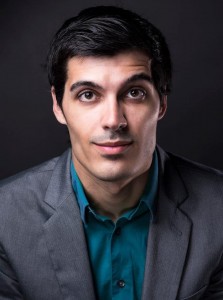 Kevin Broccoli is a writer, actor and producer. His plays include American Strippers, Kill the Virgin, and Rose’s Money. He serves as artistic director at Epic Theatre Company, and is the proud author of two books, But That’s Just Me and To Cleopatra on Her 16th Birthday. Kevin lives in Johnston.
Kevin Broccoli is a writer, actor and producer. His plays include American Strippers, Kill the Virgin, and Rose’s Money. He serves as artistic director at Epic Theatre Company, and is the proud author of two books, But That’s Just Me and To Cleopatra on Her 16th Birthday. Kevin lives in Johnston.
Alison O’Donnell: What and/or who is your inspiration? Where do you draw your ideas?
Kevin Broccoli: I’m usually inspired by something that bothers me. I see a problem and I want to send a bunch of invisible people to solve it or take it apart. I usually start with that and a good title and go from there.
AO: Favorite play ever? Why?
KB: I really do love Take Me Out. I just think it’s perfect. Being in it years ago was a dream come true. There’s so much art in the line. The words just stay in your brain forever.
AO: How do you handle writer’s block? What hooks get you started?
KB: For me, the only way to get through writer’s block is to keep writing. Just write your way out of it. You may write a thousand awful pages before you get to anything decent, but those thousand pages are necessary. Just keep writing.
AO: What’s next on your slate?
KB: I’m currently working on a bunch of interconnected plays that look at superheroes and superpowers. I want to create the theatrical equivalent of the Marvel Cinematic Universe.
AO: Ultimate dream project?
KB: I want to write for television one day. It’s my favorite medium.
AO: Advice for aspiring playwrights?
KB: Write. Write. Write every day. It will change your life. It will make your life better. It can save your life. Just write.
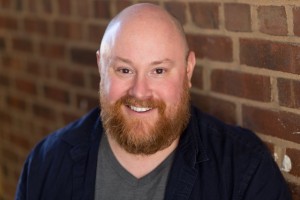 Ben Jolivet’s plays include Tig, Get Rough with Me, Cain+Abel, and Want Went Down. His play Cold won the David Getchell New Play Award, received a citation from the Kennedy Center American College Theatre Festival, was a semifinalist for the Princess Grace Award and finalist for the Woodward and Newman Drama Competition. He was a 2013 Mass Cultural Council Dramatic Writing Fellow. Jolivet holds a BA from Southern New Hampshire University and is finishing his MFA at Hollins Playwrights Lab in Roanoke, Va. He lives in Cranston.
Ben Jolivet’s plays include Tig, Get Rough with Me, Cain+Abel, and Want Went Down. His play Cold won the David Getchell New Play Award, received a citation from the Kennedy Center American College Theatre Festival, was a semifinalist for the Princess Grace Award and finalist for the Woodward and Newman Drama Competition. He was a 2013 Mass Cultural Council Dramatic Writing Fellow. Jolivet holds a BA from Southern New Hampshire University and is finishing his MFA at Hollins Playwrights Lab in Roanoke, Va. He lives in Cranston.
Alison O’Donnel: What and/or who is your inspiration? Where do you draw your ideas?
Ben Jolivet: When I was growing up, a lot of my inspiration came from writers I really admired — Paula Vogel, Tony Kushner. As I’ve grown up and grown into the world, my inspiration now really comes from the reality that, as a white, cis-gendered man, I’m taking space in a community that has offered people like me more opportunity than is reasonable. So, what I take inspiration in now is in large part about finding ways to use that position of privilege to get other people at the table. Where can I write great roles for women or genderqueer people? Where can I encourage casting that more accurately reflects the population of this country? How can I write roles and plays that allow for that reflection of the actual population? That’s what gets me at the keyboard now. I don’t always succeed, I do not have the answers, but I try.
AO: Favorite play ever?
BJ: Uncle Vanya by Anton Chekhov. It could have been written yesterday. The way the characters struggle with love and the Earth and the need to feel like they’ve accomplished something lasting in the world? It kills me.
AO: How do you handle writers’ block?
BJ: I allow myself to take breaks. I tend to write in big bursts, so I’m not someone to writes every day, and sometimes I burn myself out. So, during what I call the “fallow times,” I try to consume more — refill the battery. But to me, writers block is sometimes more about having too many possibilities than too few. When I’m faced with block on a specific project, I try to find a bounding box that will help me narrow down what could happen. When I can’t, sometimes that’s because I haven’t defined my characters well enough. If you listen to them, characters often will tell you what they would do.
AO: Next on your slate?
BJ: As I type this, I’m working on my thesis for my MFA — so that’s what’s next. Getting that play into shape. It’s kind of a big play with a lot of characters, and it’s long. But I’m really excited about that. I’ve got a few projects I’m hoping will come to fruition, too, but they’re too early to know.
AO: Ultimate dream project?
BJ: I don’t really know. I tend to get excited about whatever it is I’m doing. Mostly, my dream is to get my work into the hands of audiences who are going to enjoy it. However I get there, usually, is A-OK with me.
AO: Advice for aspiring playwrights?
BJ: This goes not just for playwrights, but directors, actors, anyone making theater. Whatever you’re making, no matter how challenging it might be, remember that you’re asking people to leave their comfy homes, drive somewhere, find parking and sit with your story in usually uncomfortable chairs in a space probably not as well-heated or air-conditioned as they would like. They’re giving you the gift of their time, so try as hard as you can to give them something that makes it work it. Put your best out there. Not everyone’s going to like everything you make, and that’s not the point — the point is that you try to put something out that is worth their time and the money they spent. Don’t settle for good enough. Push yourself as far as you can go to make it your best. And then, once performances start, no matter what happens, you can rest assured you gave it your all.
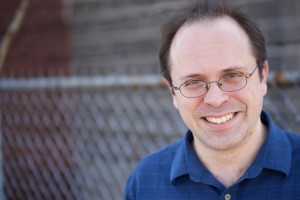 Lenny Schwartz’s premiere play was Lost in a Daydream in 1996. In 1999 he directed what was to be Daydream Theatre Company’s first show, The Scarecrow. Since then he has written and directed over 40 plays. Awards include Motif’s Best New Work 2008 for The Scarecrow, 2009 for The Wire Game, 2017 for Ben Minus Zoe Minus Ben, and 2011 More Teeth. Buster Keaton: Fade to Black. Planet Connections NYC Best Playwriting 2013 for Subject 62, and 2016 for The Social Avenger and many more. He is also a screenwriter with several films to his credit including, but not limited to, Murder University, Normal, Accidental Incest, Long Night in Dead City (Best Screenplay and Feature 2017 Shawna Shea Film Festival) and Higher Methods.
Lenny Schwartz’s premiere play was Lost in a Daydream in 1996. In 1999 he directed what was to be Daydream Theatre Company’s first show, The Scarecrow. Since then he has written and directed over 40 plays. Awards include Motif’s Best New Work 2008 for The Scarecrow, 2009 for The Wire Game, 2017 for Ben Minus Zoe Minus Ben, and 2011 More Teeth. Buster Keaton: Fade to Black. Planet Connections NYC Best Playwriting 2013 for Subject 62, and 2016 for The Social Avenger and many more. He is also a screenwriter with several films to his credit including, but not limited to, Murder University, Normal, Accidental Incest, Long Night in Dead City (Best Screenplay and Feature 2017 Shawna Shea Film Festival) and Higher Methods.
Alison O’Donnell: What and/or who is your inspiration? Where do you draw your ideas?
Lenny Schwartz: My inspiration is the world and the people in it. I just write what I feel. And I just go from there. I love to tell stories and I always will. I’m also inspired by creative people. Anybody who is creating something and trying to do something new inspires me.
AO: Favorite play ever?
LS: My favorite play ever is Anything Goes. It was the first musical I was in when I was 16. I loved it. Of course, I wasn’t in the last few scenes so I never bothered to find out or read how it ended. So I just pretended the boat got lost and landed in German waters and was promptly sunk. What a great musical. I do also enjoy Barefoot in the Park. If somebody wanted me to direct it, I might.
AO: How do you handle writer’s block?
LS: I have never gotten writers block as I don’t believe in it. I believe in being lazy and having “writer’s laze.”
AO: Next on your slate?
LS: I’m currently bringing my new musical The Inside of His Severed Head to the 2018 Planet Connections Theatre Festivity in NYC August 3-5. After that I am directing three projects I have written: Ditko, about Steve Ditko — the co-creator of Spiderman. Dr. Strange for fall 2018. And Me Three: A Guide to New Beginnings, which is about the current climate we find ourselves in both with all of these celebrities committing these horrible acts and our current political climate. It’s a messed-up comedy from hell, and is the third part of The Social Avenger trilogy. I hope everyone hates it!
Then in fall 2019 I’m doing the play Seduction of the Innocent based on the Wertham book. I just broke ground on writing it and I’m excited. I’m also helping producer Richard Griffin direct his play version of Titus Andronicus in November. Speaking of which, Richard is a filmmaker who directed a script I helped write called Codename: Dynastud, and I also wrote the upcoming film — coming in September — called Higher Methods. I’m also sneaking in a night of superhero plays I wrote, sometime in the next three months.
AO: Ultimate dream project?
LS: I’m doing them right now. I mean, sure I would love to have more money and sometimes not have to worry. But my favorite thing is always what I am working on at the moment. That being said, I’m working on a second musical called Pussy Hannukah Comes to Harlem. It’ll be THE feel-good musical of 2020! And … I’d love to write and direct a Transformer film with at least one Wahlberg too. There’s that.
AO: Advice for aspiring playwrights?
LS: Write every day. And listen to people. And then don’t listen to them at all.

